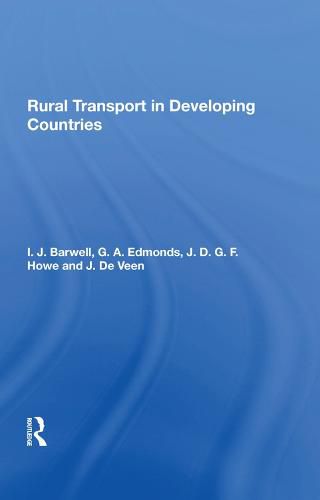Readings Newsletter
Become a Readings Member to make your shopping experience even easier.
Sign in or sign up for free!
You’re not far away from qualifying for FREE standard shipping within Australia
You’ve qualified for FREE standard shipping within Australia
The cart is loading…






For more than three decades investment in the transport sector has been a priority for developing country governments. With a few exceptions, roads have accounted for the major part of these investments. The explicit, and often articulated, assumption upon which the decision to allocate such large sums of money to road transport has been made is that road transport and development are inextricably linked. The implicit, and rarely articulated assumption is that the provision of suitable roads will lead to the operation of an adequate level of road transport services. If roads do not actually produce economic development, it has been argued, they certainly play a major role. This belief in the ben-eficial effects of roads is not wholly unsubstantiated. Clearly the provision of some form of access is vital for the development of the rural economy. Nevertheless, the studies carried out over the last 10-15 years on the impact of highway investment have sounded a cautionary note. George W. Wilson, writing in the concluding chapter of the Brookings Institution studies on transport and development, suggested that* ‘A much more sceptical attitude towards transport appears essential and far more attention needs to be devoted to the set of circumstances surrounding expansion of transport capacity’. 1 The suggestion of a more restrained attitude reflected a growing concern that transport, and in particular roads, was only one factor amongst a large number that needed to be integrated for effective development. The concern to see road transport in a wider context partly explains the move towards the evaluation of the social, as well as strictly economic, benefits of road construction.
$9.00 standard shipping within Australia
FREE standard shipping within Australia for orders over $100.00
Express & International shipping calculated at checkout
For more than three decades investment in the transport sector has been a priority for developing country governments. With a few exceptions, roads have accounted for the major part of these investments. The explicit, and often articulated, assumption upon which the decision to allocate such large sums of money to road transport has been made is that road transport and development are inextricably linked. The implicit, and rarely articulated assumption is that the provision of suitable roads will lead to the operation of an adequate level of road transport services. If roads do not actually produce economic development, it has been argued, they certainly play a major role. This belief in the ben-eficial effects of roads is not wholly unsubstantiated. Clearly the provision of some form of access is vital for the development of the rural economy. Nevertheless, the studies carried out over the last 10-15 years on the impact of highway investment have sounded a cautionary note. George W. Wilson, writing in the concluding chapter of the Brookings Institution studies on transport and development, suggested that* ‘A much more sceptical attitude towards transport appears essential and far more attention needs to be devoted to the set of circumstances surrounding expansion of transport capacity’. 1 The suggestion of a more restrained attitude reflected a growing concern that transport, and in particular roads, was only one factor amongst a large number that needed to be integrated for effective development. The concern to see road transport in a wider context partly explains the move towards the evaluation of the social, as well as strictly economic, benefits of road construction.